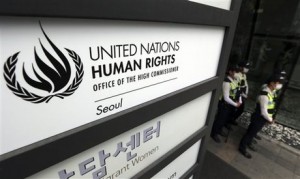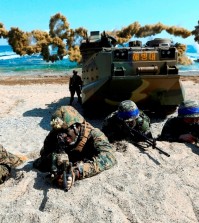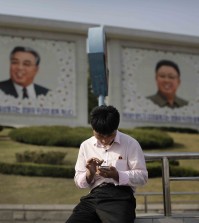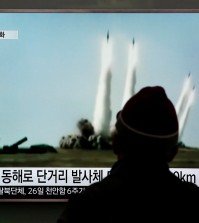- California Assembly OKs highest minimum wage in nation
- S. Korea unveils first graphic cigarette warnings
- US joins with South Korea, Japan in bid to deter North Korea
- LPGA golfer Chun In-gee finally back in action
- S. Korea won’t be top seed in final World Cup qualification round
- US men’s soccer misses 2nd straight Olympics
- US back on track in qualifying with 4-0 win over Guatemala
- High-intensity workout injuries spawn cottage industry
- CDC expands range of Zika mosquitoes into parts of Northeast
- Who knew? ‘The Walking Dead’ is helping families connect
N. Korea responsible for 1,400 public executions since 2000

South Korean police officers stand guard by a signboard of the newly opened office of the United Nations High Commissioner for Human Rights in Seoul, South Korea, Tuesday, June 23, 2015. North Korea has scrapped plans to attend next month’s University Games in South Korea to protest the opening Tuesday of the U.N. human rights office in Seoul, South Korean officials said Monday. (AP Photo/Lee Jin-man)
North Korea is responsible for publicly executing 1,382 individuals since 2000 for a wide range of reasons from accusations of espionage to watching South Korean dramas according to a new report by the Korea Institute for National Unification (KINU) — a think tank run by the South Korean government.
KINU gathered the data by speaking with North Korean defectors and believes that this methodology leaves many deaths unaccounted for.
The annual figures peaked in 2008 with 162 executions, but has fallen drastically since then to five in 2014.
It is possible that since North Korea has been under growing scrutiny with its recent nuclear weapons development and rocket tests, it has refrained from its normal level of alleged human rights abuses or is trying to more actively cover up its actions.
The United Nations (U.N.) recently set up a human rights office in Seoul for the sole purpose of monitoring the North’s activities.
Although the North has denied on several occasions of having prison camps, UN reports have shown that there are at least five within the country that hold over 100,000 prisoners.















